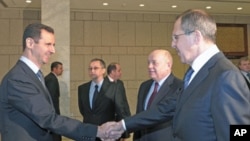Syria says it is drawing up a new constitution as government forces continue to bombard opponents of President Bashar al-Assad. The Obama administration says Assad's plans for a constitutional referendum fall short of the democratic aspirations that have fueled an 11-month uprising.
Assad met Tuesday with Russian Foreign Minister Sergei Lavrov, who told reporters in Damascus that he is trying to resolve the political crisis in Syria based on Arab League calls for a national unity government and early elections.
Assad said parliamentary voting would follow ratification of a new constitution, the drafting of which Syrian state TV says is now complete.
But U.S. State Department spokeswoman Victoria Nuland said President Assad's promises of political change are harder to believe, as his forces continue to bombard civilians.
"You can understand that the international community as a whole would be pretty skeptical if, instead of focusing on ending the violence, what we seem to have is a re-upping of this same offer that Assad has been making for months and months and months that he would put forward some sort of constitutional referendum and have people vote on it," said Nuland.
Nuland said the offer appears to fall short of the democratic aspirations of his opponents.
"It sounds like another promise by the Assad regime to put forward a piece of paper that they control for a vote that they can control. And frankly, how that gets us to the kind of peaceful national dialogue about a democratic future for Syria that we all want to see is not very clear," said Nuland.
The Russian foreign minister said Assad is ready for talks with all political forces and is prepared to put an end to violence "regardless of where it may come from."
Nuland said it is Syrian government forces that must stop attacking civilians.
"If, in fact, Assad supports the end of violence, he knows what he can do today, which he has neglected to do for these 11 months. He can stop the attacks by his forces on innocents in cities across Syria," said Nuland.
Lavrov and Assad appear to be working off a November Arab League plan that does not include subsequent calls for the president to step down. That provision, in part, led to Saturday's Russian and Chinese veto of a United Nations Security Council resolution backing the latest Arab League plan.
Blocked at the U.N., the Obama administration is organizing a "Friends of Syria" group to deepen President Assad's diplomatic isolation, increase sanctions, and bring pressure on countries that are still supplying weapons to the Syrian army, principally Russia.
U.S. Secretary of State Hillary Clinton discussed the "Friends of Syria" plan with Turkish Foreign Minister Ahmet Davutoglu at the Munich Security Conference. European nations including Britain, France, and Germany are on board, as are many members of the Arab League.
Brookings Institution visiting fellow Khaled Elgindy said it is a bold move by members of the largely-conservative Arab League, which are unaccustomed to standing up to fellow member states, especially one as prominent as Syria.
"We’ve seen individual states like Tunisia and Libya have initiated the process of expelling their Syrian ambassadors in those countries. So I think there are still things that Arab League member states - I think - can do individually or collectively to further isolate Syria. I think that will be the next phase of collective Arab action - to try to isolate Syria more diplomatically," said Elgindy.
State Department spokeswoman Nuland said the "Friends of Syria" group also will look to provide humanitarian relief and political support for Assad opponents.
But she would not say whether Washington's support extends to the rebel Free Syrian Army - echoing Obama's insistence that the conflict be resolved without military intervention, and drawing a distinction between the "Friends of Syria" and the Libya Contact Group that ultimately led to NATO air strikes against Moammar Gadhafi.
| Join the conversation on our social journalism site - Middle East Voices. Follow our Middle East reports on Twitter and discuss them on our Facebook page. |















